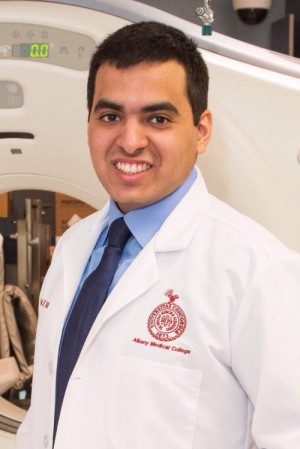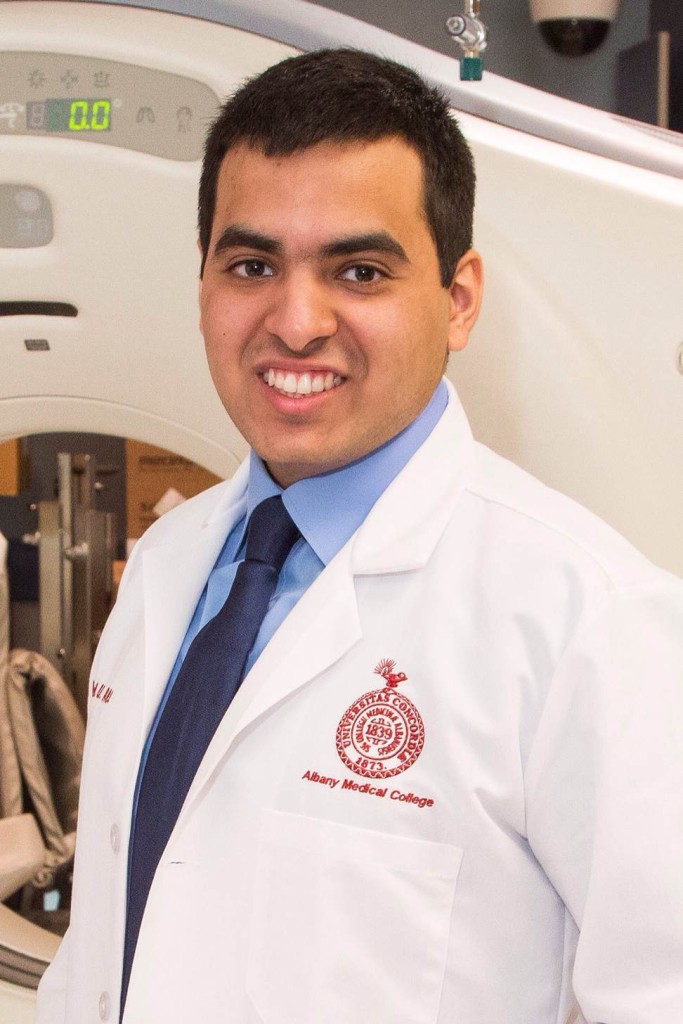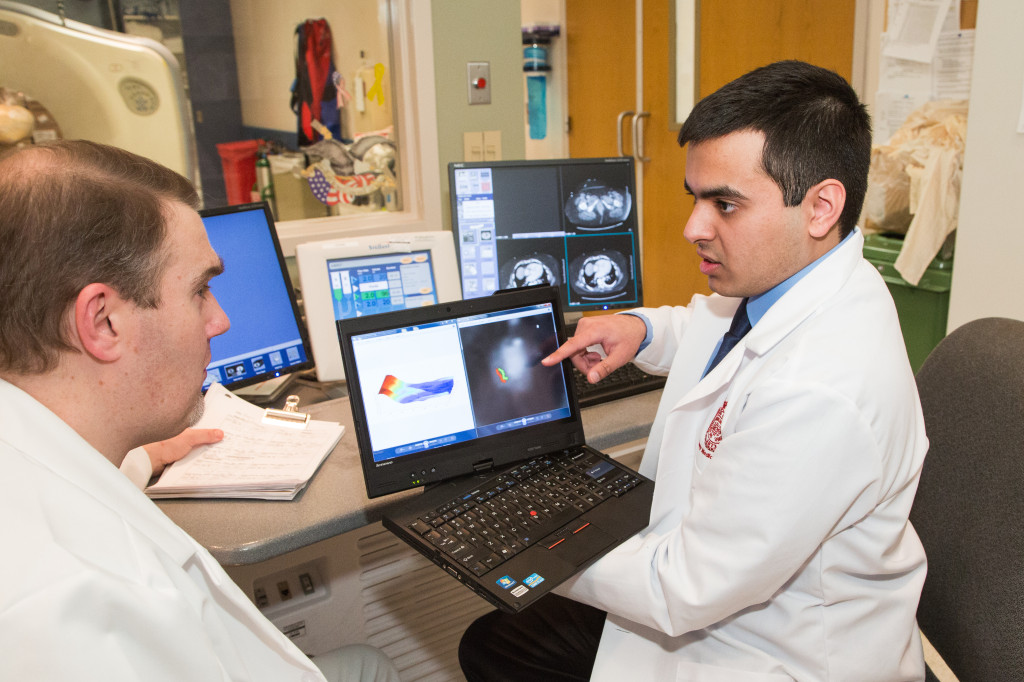It’s not often that a medical student gets to lead a research project. It’s even more uncommon to see physicians-in-training solving complex problems in the fields of biotech and medical technology. That is, until you’ve met Nabeel Ali.
Nabeel, a second-year medical student at Albany Medical College, paved a singular path to medical school. Starting as an electrical engineering major at Rensselaer Polytechnic Institute, he switched to biomedical engineering to pursue medicine.
Just a few years later, Nabeel is now a research fellow at Massachusetts General Hospital, investigating how to detect high-risk coronary plaques using CT imaging. Nabeel’s research is funded by a grant from the Radiological Society of North America and has won numerous awards, including a first-place award from the Association of University Radiologists.
In the arena of medical imaging research, a field in which medical students rarely participate, Nabeel is a leader and an innovator, and he is passionate about mentoring students interested in being innovators in medicine.
In this interview, Nabeel talks about the tumultuous and unpredictable pathway into medicine, as well as how medical students can become better engaged in the burgeoning field of medical innovation.
Ajay Major (AM): When did you start at MGH, at the Massachusetts General Hospital?
Nabeel Ali (NA): The summer after my junior year at RPI [Rensselaer Polytechnic Institute] is when I first started, so I’ve been there for three years, mainly during summers.
AM: How did you get into an MGH lab as an undergrad? That’s no small feat.
NA: My research at RPI – and a brief stint at UC Berkeley — were both in the realm of cardiovascular sciences, which I loved. So, I cold-called a bunch of principle investigators and mentors at Mass General, because they’re doing great work over there, and I said, hey, listen, I’m at RPI, I’m an engineering major, and some of my peers here are doing great research, would you take me in? And after some convincing, and a little bit of luck, I got a couple replies. One thing led to another, and I started my gig in a cardiac imaging lab under a prominent radiologist as Mass General.
AM: Sounds like you put all your eggs in one basket.
NA: Maybe it was luck, maybe it was my overly-excited appeals. To this day, I don’t know why he took in an undergrad, but I’m really thankful for that.
AM: What are some of the biggest challenges you face as medical student doing this type of research?
NA: As you know, I got a grant from the Radiological Society of North America, so for one project I’m working on at Mass General, I’m considered the principle investigator. It’s odd when I say that. The hardest part is that, as a medical student, I’m held to the exact same standards as the other research fellows in my group. And a lot of the research fellows are full blown radiologists or cardiologists. So when I’m in a conference or a meeting of our lab group, I’m expected to deliver.
AM: There don’t seem to be a lot of medical students doing really intense med tech or biotech research like you’re doing. So, what is that climate like academically and research-wise for medical students?
NA: It’s not nonexistent, but it’s relatively uncommon to find students who are at this stage in their career, medical students, who are doing this kind of research. In order to do this kind of research, you have to be immersed in the subject matter in which you’re doing the research, but then you also have to have the technical background to be able to analyze clinical problems, think of solutions, and invent the technology.
I was in a unique position in that my training in biomedical engineering was focused on instrumentation, so I have this technical expertise, if that’s what you want to call it, in computer science, hardware and software design, data analysis. So, I’m able to apply those skills to the cardiovascular system, coronary arteries specifically, in order to innovate these technologies. But if you don’t have that kind of tech background, you don’t necessarily know what the potential avenues are to design solutions.
One of the ideas I continually advocate for is that we need more engineers and technical people in medicine, because you have to understand, on one hand, the problems we are facing in the clinic. On the other hand, you have to understand how those problems are amenable to solutions by engineer-like thinking. And then the next step obviously is to innovate, to create. You have to have a handle on all of those other aspects to solve a problem.
So as a medical student, it’s very difficult. I haven’t seen too many people with an engineering background go into medicine. I would personally love to see more because I think it would have very fruitful benefits for the field.
AM: So, medical students are vastly underrepresented in fields that are vital to the future of medicine, innovation being one of them, humanities being another one. What’s your advice for people who might be interested in a career in medical innovation?
NA: It’s a creative process. Medical students are busy burning the midnight oil – medical school is no joke. What I would say is to think from a very high-level perspective of what’s happening in the clinic, so when you’re doing your rotations, observe. Observe the problems that are there, the areas you can potentially apply your training and expertise in order to benefit that specific area. As students, we’re observers. Our main job is to observe. So, observe, and when you’re in a position to catalyze and affect change, act on those observations.
If you’re particularly ambitious, affect that change now. I realize a lot of medical students aren’t engineers, but that doesn’t mean you can’t bring the problem to tech-oriented people and say, hey, there is this problem in the clinic, now how can we use technology to develop a solution?
But, technology is just one avenue medicine can benefit from. We also need people with backgrounds in policy, business, humanities and public health to create change in medicine.
Really, I hope we’re all ambitious, and we have that desire to improve medicine and improve outcomes for the patients we work with. That’s what this is really all about.
—
To learn more about Nabeel’s research in coronary artery disease imaging, read this accompanying article on MedTech Boston.







